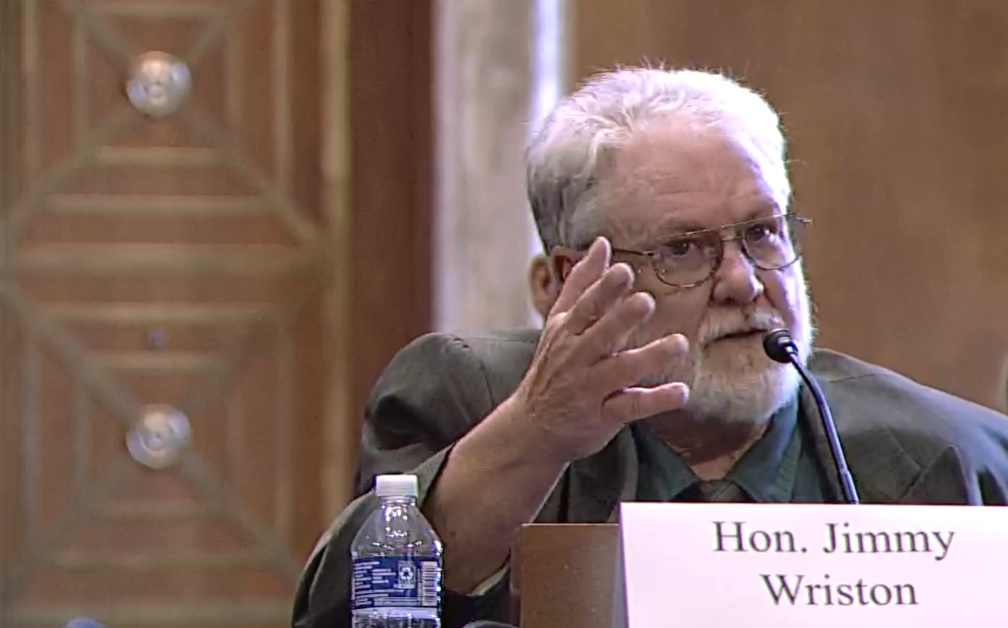West Virginia’s transportation secretary, whose personal style usually means draping his necktie around his shoulders, went traditional and formal today while telling a congressional committee about how the state will benefit from the federal infrastructure bill.

“I can tell you that I am particularly grateful for this committee, this committee has done a Herculean task. They’ve produced the most impactful transportation law that this country has ever seen I believe,” a neatly-knotted Transportation Secretary Jimmy Wriston told the U.S. Senate’s Environment and Public Works Committee today.
“I believe this is an opportunity to exceed the great achievement of building the interstates across the country in the last century. Now the real work has to happen. We have to move fast, we have to move together, we have to form partnerships to get this done and get it done efficiently to take advantage of this great opportunity.”
I agree, @WVDOT Secretary Wriston! Now, let’s work together and capitalize on our historic investment in America’s infrastructure. pic.twitter.com/LKcVKZB10O
— Shelley Moore Capito (@SenCapito) September 21, 2022
Wriston appeared on a panel of several local-level transportation officials to examine the way the bill providing funding for highways, bridges and broadband will affect people.

Shelley Moore Capito, the West Virginia senator who is the ranking Republican on the committee, proposed today’s focus and remarked on the rarity of testimony by a transportation secretary from the Mountain State.
“And we did learn today because we a little meeting before that this is the first West Virginia Secretary of Transportation to testify before our committee. So we’re very happy to have that historic occasion,” Capito said in her introduction.
The infrastructure bill received support from Capito, Senator Joe Manchin and Congressman David McKinley as it was considered by Congress. Gov. Jim Justice has also expressed support for the resources that can come through its passage.
“We’ve got a chance here that you’ve never seen because now we have the money. It’s not just the time; it’s the money,” Capito said today. “We also have the will of Congress and of the President to move forward on these things. I know our governor is very active: he wants to build and he wants to fix and maintain.
But Capito warned that the initiative can’t be squandered through inadequate communication between local and federal authorities.
“If we wait to the back end, we’re going to end up wasting money, number one, because we’re going to end up approving things that wouldn’t have been approved if they’d gotten full vetting,” she said.
“You know how it is, you start to run out of money so you get a little bit panicky and you go ‘OK, OK, we’ll do that’ and then you find out two years later, that wasn’t a good idea.”
West Virginia stands to bring down about $6 billion dollars over a multi-year period for roads, bridges, rail and broadband. For example, the state’s portion of the funding includes $506.6 million to improve more than 5,500 state bridges.
The Committee on Environment and Public Works convened Wednesday’s hearing to seek local input into implementation of the federal Infrastructure Investment and Jobs Act, also known as the Bipartisan Infrastructure Law, signed by President Joe Biden in November 2021. The law will put $550 billion into new transportation, infrastructure and broadband projects all over the United States.
“We, the state DOTs, are in the best position to know how to utilize these funds,” Wriston said. “That’s what we do.”
The Infrastructure Investment and Jobs Act programs are vital to rural states like West Virginia which rely heavily on federal funding to plan and implement bridge and highway projects. West Virginia’s portion of the funding includes $506.6 million to improve more than 5,500 state bridges.
Capito asked Wriston about aspects of the federal infrastructure program emphasizing repair and rehabilitation over new construction.
Wriston said his agency had some plans already completed and had to adjust them once federal guidance came out.
“If I can’t add capacity to my interstates, well, what am I doing to the next generation if I spend tremendous resources on a resurfacing job on I-79 in West Virginia and don’t take care of the added capacity I know I’m going to need in 12 or 15 years?” Wriston asked. “It makes planning impossible.”
Wriston spoke critically about some aspects of the infrastructure act, particularly discretionary portions that can result in complications through unpredictable funding levels, varying abilities of states to come up with matching funds and lag time until money is actually awarded before making serious plans.
Wriston expressed concern about coordination with different federal agencies, saying that West Virginia and other states have already run up against federal deadlines that came and went before federal guidance was issued on how to apply for funding and changing federal rules and requirements.
“We have to understand the guidelines, we have to move within those guidelines to achieve a goal — not just to go through an exercise or a bureaucratic process, but to move the ball toward a predictable result that we all want to take care of,” he said.
Wriston urged members of the Committee on Environment and Public Works to help cut through the red tape and make sure the provisions of the Infrastructure Investment and Jobs Act are implemented efficiently and with proper guidance.
“Give us direction, work with us,” Wriston said. “We depend on these federal agencies. We look at them not only as partners, but advocates for the state.”


